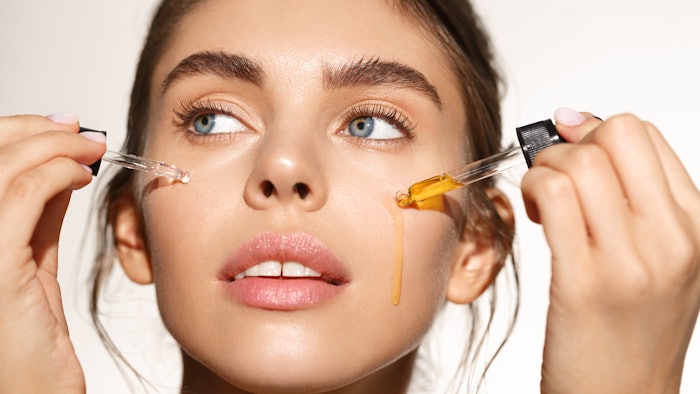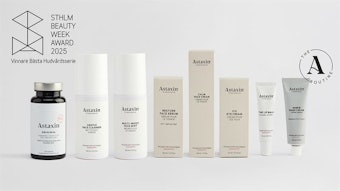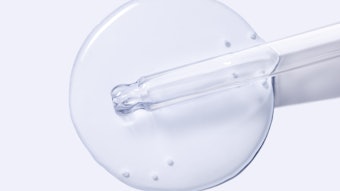
For decades people have been grappling with the management of sensitive or sensitized skin, constantly searching for new remedies. Quite often, it’s as difficult to pinpoint the etiology of sensitive skin conditions as it is to manage the pathology of many skin disorders. A good place to start is to investigate all known related conditions, catalysts and potential aggravators.
Sensitive Skin Causes
A truly sensitive skin type is most often genetic. Sensitized skin occurs due to intrinsic and extrinsic factors. This, in turn, can cause an imbalance to the acid mantel, resulting in severe dehydration. Sensitivity can be exacerbated by hormonal changes as well as improper skin care regimens. All potential sensitizers are even more damaging to sensitive skin types.
Product Considerations
When trying to determine if a product is the culprit, bear in mind that dehydrated skin is far more sensitive and reactive to all stimuli. Therefore, it may not always be a sensitivity to an ingredient as much as it’s an overreaction by the skin to the concentration/strength of the product. For example, professional hyaluronic serums are very concentrated. Thus, a noticeable percentage of clients may complain that the serum is causing itching, tingling and burning. The skin sensation from the product generally subsides as the condition of dehydration improves. It’s important to ask follow-up questions objectively and subjectively to rule out the possibility of more serious reactions or conditions.
Estheticians must be skin detectives and ask the right questions without diagnosing. If we cannot improve a known, or suspected condition, the client must be referred to a doctor, dermatologist or allergist as the case dictates. It’s important to gather as much info as possible and keep very detailed notes. Many times, the catalyst is cosmetics or skin care.
Reading Skin Care Labels
Many people think they are safe when they purchase a product labeled hypoallergenic, but this is not true. Just because a product is labeled hypoallergenic doesn’t mean that you won’t have an allergic reaction. There aren’t any federal standards governing the use of this term. The reliability of the claim is left to the ethical business practices of each company.
Another confusing label claim is the term unscented, not to be confused with fragrance free. Unscented means that masking fragrances are added to cover the unpleasant odors of necessary ingredients such as surfactants, fatty acids and oils. These neutralizing fragrances are added in levels deemed insignificant by the FDA, and therefore, they are not required to be listed on the label. Unscented products can be more likely to cause skin irritation in individuals who have sensitive skin or are sensitive to fragrance.
Thankfully, there are independent apps that can be downloaded to investigate the possible irritants in a skin care product by scanning the QR code and rating the toxicity of the product. However, it’s also important to know the purity and stability of a product line and investigate the company’s transparency. Unfortunately, quality and efficacy generally come with a heftier price tag.
Ultimately, what we put on our skin is important. However, newer research indicates what we put in our gut may be just as important, if not more so.
Related: Solving the Sensitive Skin Issue
An Inside-Out Approach
The skin can be a relief map of sorts to our internal gut health. The gut contains trillions of bacterial strains known as its microbiome. The gut is responsible for many biological reactions such as hormone metabolism and making enzymes that aid the body in detoxification. The gut also makes nutrients that help neutralize pathogens.
Since the skin and the gut are both comprised of epithelial tissue, when one experiences inflammation the other often does as well. Eating a healthy clean diet is the first step to good gut health. To do this, many allergists recommend systematically removing one potential inflammatory food at a time to determine its effect. Consuming fermented probiotic foods and drinks such as green drinks and kefir can be immensely helpful.
Probiotics and supplements can be very helpful, but finding the right ones will again involve some detective work. Of course, what you ingest is important to your overall bodily health. However, as it’s difficult for nutrients to make their way up through the waterproof layers of the skin, it’s very important to know what to apply topically. Topical Solutions for Inflammation
Products that maintain and nourish the acid mantel help to calm sensitive or inflamed skin (see Anti-Inflammatory Ingredients Guide side bar).
Anti-Inflammatory Ingredients Guide
These ingredients are great for sensitive skin.
Hyaluronic acid. A humectant that helps to bind moisture.
Glycerin. A humectant that helps to bind moisture.
Ceramides. An emollient that helps to prevent transepidermal water loss (TEWL).
Fatty acids. An emollient that helps to prevent TEWL.
Niacinamide. An antioxidant with anti-inflammatory properties, as well as lightening and brightening benefits for post-inflammatory hyperpigmentation (PIH). Is great when combined with ceramides for reducing oxidative stress and glycation in sensitive skin. It also helps reduce proinflammatory cytokines, reducing redness and inflammation.1
Vitamin C. This antioxidant can be great for soothing sensitive skin when mixed with ceramides and formulated at a little higher Ph. It can discourage oxidative damage and help optimize the immune system, aiding in the prevention of an inflammatory response. Using a formulation around a 10% concentration with a bit higher Ph will reduce the risk of irritation.
Retinols. Over-the-counter retinol can sometimes be the better choice for sensitive skin, as Retin-A from the doctor is much stronger. Sensitive skin can benefit from a gentler retinol formulated with a buffering agent or lotion. It’s advisable to start off slowly with this ingredient when dealing with sensitive or inflammatory skin. Also, after using retinol for a while, try stopping for several months to let your normal cell turnover resume and give your skin a break, so that it doesn’t become too thin or sensitized.
Don’t Forget Your Minerals
Another important component vital to bodily health is minerals. They are necessary along with vitamins, to keep the body running efficiently. Minerals in the body are instrumental for water balance, bone, muscle, nerve, hormonal health and much more. They also aid in intercellular nutrient transportation and pH balance. It would stand to reason that minerals used in skin care can help to keep your skin radiant and healthy.
Some key minerals you may want to research in skin care lines are:
- Calcium. This is a trace element found in relatively large quantities in the body. Calcium in skin care can greatly help sensitive skin, as it has cell renewal benefits for the skin barrier. It plays an important role in many biochemical processes.
- Selenium. This trace element is important for DNA and is said to help protect your skin from oxidative stress.
- Zinc. This is an important healing mineral, which is depleted by alcohol.
- Silver. This mineral has well-documented healing properties. It’s anti-inflammatory and anti-microbial, and a powerful antioxidant that reduces oxidative stress. Silver hydrosol is said to be the safest and most active form of silver to use in skin care.2
- Copper. This mineral helps to give skin strength and elasticity, and it enhances other antioxidants. Copper tripeptide 1 has ant-inflammatory and antioxidant effects, and is great for regenerating sensitive or damaged skin.
Becoming a Sensitive Skin Detective
There are many contributing factors concerning sensitive and sensitized skin. Be aware of your environment, own your gut health, and investigate the efficacy and purity of your products. Always research new findings and don’t jump to conclusions without doing some thorough esthetic detective work. As an esthetician, be sure to stay at the forefront of new information and technology.
References:











